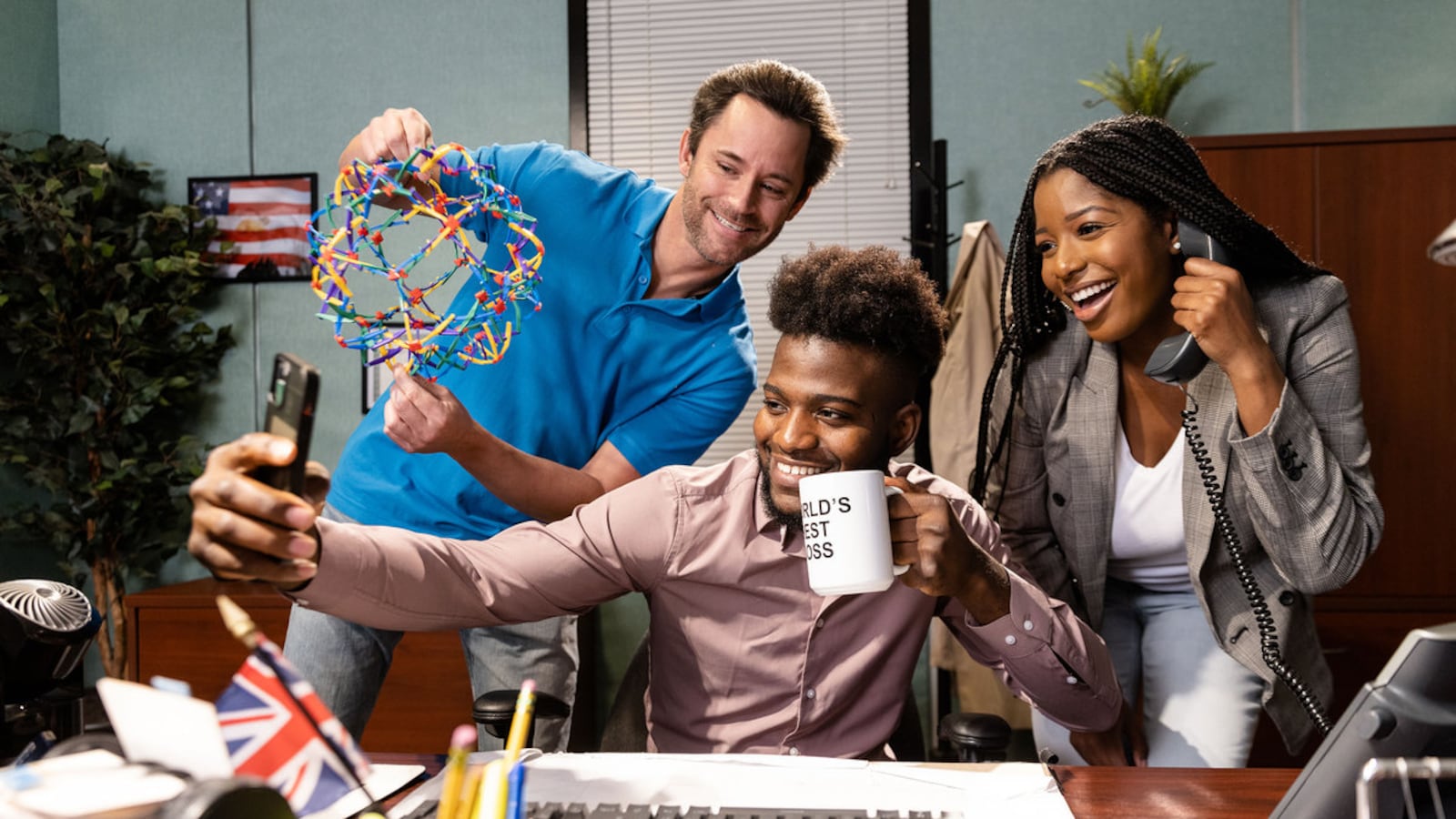A vat of spilled chili looms in the bowels of The Office Experience. It levitates in mid-air, the cascading beans and sauce frozen in stasis as they tumble and splat against the carpet. Even if you’re the most disengaged fan of the titular NBC sitcom, you will immediately recognize this as a scene from Season 5, Episode 26, when Kevin—the lovable putz played by Brian Baumgartner—trips, falls, and accidentally desecrates Dunder Mifflin with a brown stew of questionable consistency.
It's one of the most famous gags in the history of The Office, and this exhibit serves as its shrine. Visitors take their spot behind the vessel and twist their face into a Kevin-ish expression, as their partners capture future Instagram grid shots. With tickets starting at $35, they're hell-bent on getting their money's worth.
The chili vat is just the tip of the iceberg. The Office Experience winds its patrons through a zoo of Office locales and memorabilia, all rendered with exacting, Disneyland-like detail. There is, for instance, a perfect replica of Pam's reception desk, complete with a collage of in-universe sticky notes pinned to her computer monitor. That tiny, Protestant, western New York chapel where Jim and Pam get hitched has also been fully constructed; Walk inside, and you'll hear an instrumental loop of Chris Brown's "Forever" echoing down the nave.
You can visit Daryl's warehouse and Dwight's beet farm, and you’ll discover a trove of easter eggs along the way. The stapler encased in Jell-O is here, as is the purple bandana donned by Prison Mike. Spreadsheets and infographics line the walls, detailing, for instance, every single "That's what she said" uttered on the program, or the fictional career afterlifes of ancillary figures like Creed, Erin, and yes, Toby.

The office itself looks ... pretty drab. Much like on the show.
Luke WinkieIt is, in other words, a veritable museum of Office minutia—laden with picturesque photo ops that are ruthlessly engineered to win the hard-earned dollars of aging millennials. I arrived at the Washington, D.C., location around noon on Black Friday, alongside a swathe of other thirtysomethings eager to tear through the doors and inhabit the life of a bemused paper salesman. Make all the jokes you want, but The Office Experience absolutely understands its assignment.
"With us, we always start by asking, 'What would I expect to see? What would I be disappointed not to see? And what would I be surprised to see?'" said Stacy Moscatelli, co-president & chief strategy officer at Original X Productions, the company behind The Office Experience. "You want to be able to walk into the office and have a moment where you feel like you're Jim, or Pam, or Michael, if that's your thing. We wanted them to have the opportunity to not just sit at the desk and take a picture. But we want them to be able to open [the characters’] drawers, and see their computer desktops. We knew that really hardcore fans would know the difference."

Original X Productions has built a small empire out of the first glimmers of millennial nostalgia, which is quickly emerging as one of the most profitable sectors in the entertainment industry. In addition to Dunder Mifflin, the company hosts The Friends Experience—where that luxurious Greenwich Village apartment has been revitalized for anyone who purchases a ticket, from San Francisco to Paris—as well as a Harry Potter experience, where your loved ones can explore the Forbidden Forest and summon their own Patronuses.
Yes, Original X are licensees rather than licensers; The Office Experience is a product of an agreement between NBC Universal and Deedle-Dee Productions, the Greg Daniels vehicle behind The Office, Parks & Recreation, and King of the Hill. Moscatelli tells me that the company is always on the lookout for more mainline veins of lowest-common-denominator pop-culture touchstones to reap. "It's about finding the right IP, the right fanbase, and the right partner," she said. (May I suggest 30 Rock?)

I do not represent Moscatelli's target market. At best, I am a casual fan of The Office. I jumped into the series in 2008, and mostly consumed episodes that—by most critical assertions—represented the grim flop era for the ensemble. (The first Office season I watched in full is the same one where Jim and Pam get engaged, which absolutely infuriates my girlfriend, who talks about The Office in the same way sketch-comedy bros talk about the first few years of The Simpsons.) I don't possess any implicit biases towards the show; it simply is not within my personal tableau of network television that tends to shape an American, which I understand makes me something of an outlier.
That is categorically not the case for Denise Rosales, a 41-year-old teacher from Texas, who was queued next to me as we waited for the exhibit to open. Rosales doesn't have any family in the DC area, but she specifically planned a Thanksgiving trip to the nation's capital so she could visit the Experience. For her, it was like taking a pilgrimage right to Dunder Mifflin.
"My mom and dad are out there sightseeing. I took them to some monuments. But my main reason for coming here is The Office," said Rosales, who was dressed in a Stanley-themed T-shirt. "I've seen the whole series a million times. It's gonna bring back those memories."

All the data a fan would want—and a superfan would probably already know.
Luke WinkieThe Office was not the only popular sitcom in the mid-to-late-2000s. My Name Is Earl ran for 96 episodes, and How I Met Your Mother was on the a8r for nine years, but neither of those shows have the slightest chance of being sanctified by their own traveling theme park—a destination worth adjusting holiday plans for. You could argue that The Office represented the last vestiges of a monoculture that was already starting to atrophy by the Bush years, and yet, the best performing season of the show only averaged 11 million viewers—a far-cry from the 40 million regularly commanded by The Cosby Show in the ’80s.
In that sense, I think it's more likely that The Office simply calcified a certain phenotype of broadstroke millennial diction, one we're still feeling to this day. If you are an American in your 30s, that means you've endured untold “That's what she said” riffs, innumerable normie Michael Scott reaction gifs, and a legion of Tinder profiles begging to find a Jim or a Pam. The smirking, semi-ironic, Reddit-toned verve of The Office lives on in pithy Marvel scripts and Twitter bios to this day. It's in our bones. We can't escape.
In fact, the more time I spent in The Office Experience, the more it became clear that for so many young(ish) people, loving this sitcom is pure, primordial instinct; as natural as drinking water. "It's got humor, it's got love, it's got awkward moments," says Patrick Flynn, a 34-year old, who started watching The Office in college and visited with his partner. (He also graciously agreed to be interviewed outside of the Experience.) "It's got relatable characters. It's got Steve Carrell."
You likely won't be surprised to know that the people who actually work for the exhibit do not share the heritage of Flynn or me—which is to say that most of them were born after the turn of the millennium. One employee told me she was not an Office fan in her youth, but mentioned that Original X trained its staff of zoomers to be fluent in all sorts of Dunder Mifflin minutia. "They showed us clips so we were familiar with the characters, so we knew how to talk to guests," she said. (I agreed to keep her anonymous for job security purposes.)
When I asked if she's become an Office superfan since taking the job, she said that she preferred the early seasons. We've taught the children well. Our legacy is secure. Plenty of things suck about getting old, but I think there is one simple joy that millennials are currently discovering: At last, we're the demographic being pandered towards. It's never felt so good to be washed up.






